英语人教版八年级下册Unit3 Could you please--
- 格式:doc
- 大小:27.00 KB
- 文档页数:4

Unit3 Could you please clean your room?Section A重点短语go out for dinner 出去吃饭stay out late 在外面待到很晚go to the movies 去看电影get a ride 搭车work on 从事finish doing sth. 完成做某事clean and tidy 干净整洁do the dishes 洗餐具take out the rubbish 倒垃圾fold your/the clothes 叠衣服sweep the floor 扫地make your/the bed 整理床铺clean the living room 打扫客厅no problem 没问题welcome sb. 欢迎某人come home fro m school/ work放学/下班回家throw down 扔下sit down 坐下come over 过来take sb. for a walk 带某人去散步all the time 一直;总是all day/evening 整曰/夜do housework 做家务shout back 大声回应walk away 走开.share the housework 分担家务a comfortable home 一个舒适的家in surprise 惊讶地get something to drink 拿点喝的东西watch one show 观看一个节目hang out 闲逛pass sb. sth. 把某物传给某人lend sb. sth. 把某物借给某人get sth. wet 使某物弄湿hate to do sth. 讨厌做某事do chores 做杂务help sb. (to ) d o /with sth 帮助某人干某事bring a tent带顶帐篷来buy some snacks买些小吃go to the store去商店invite sb. to a party邀请某人参加聚会make sb. do sth. 使某人做某事enough stress足够的压力waste of time浪费时间in order to为了get good grades取得好成绩mind doing sth. 介意做某事depend on依赖;依靠develop children’s independence发展孩子的独立性look after/take care of 照顾;照看do one’s part in (doing ) sth.做某人分内的事二、重点句型1. Could you please…..do sth. ?Could you please clean your room?你能整理一下你的房间吗?2. I have to do some work.我必须干些活。

Unit 3 Could you please clean your room?单元教学目标:三维目标:1语言目标:谈论做家务的词汇,及如何有礼貌的提出要求。
2 技能目标:能听懂和谈论做家务的话题;能写出重点单词和重点句型。
3 情感目标:培养学生爱劳动,分享家务的能力。
教学重点短语: do the dishes, make the bed, take out the rubbish, fold the clothes, sweep the floor, clean the living room ……句子:1. Could you please take out the rubbish?. Sure. / Sorry, I can’t. I have to finish homework first.2. Could I use your computer?Sorry. I'm going to work on it now.3. Well, could I watch TV?Yes, you can. But first you have to clean your room.教学难点:Make polite requestsAsk for permission课时划分:Period 1 Section A 1a – 2dPeriod 2 Section A 3a-3cPeriod 3 Section A Grammar focus-4cPeriod 4 Section B 1a-2ePeriod 5 Section B 3a-self checkSection A1 (1a – 2d)三维目标:1知识与技能:1〕重点单词和词组2〕使用could 做出礼貌要求和请求许可。
2.过程与方法:通过合作探究的方法结局本课的重点知识点3.情感态度与价值:学会照顾自己,培养自己的独立意识。
教学重点:谈论做家务的词汇,情态动词could的使用方法。



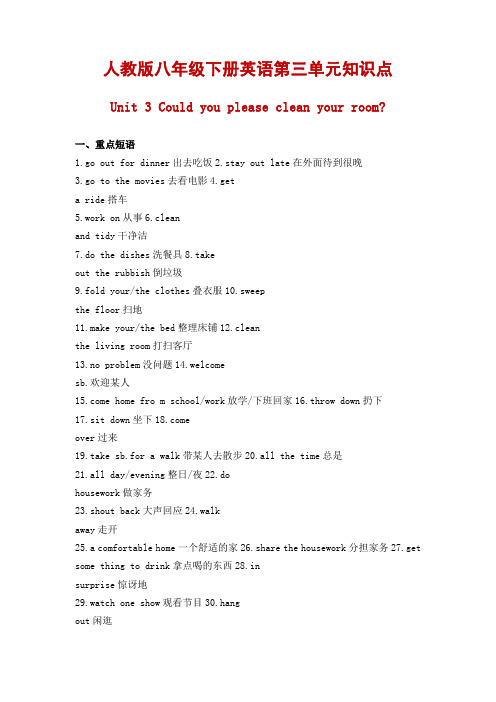
人教版八年级下册英语第三单元知识点Unit 3 Could you please clean your room?一、重点短语1.go out for dinner出去吃饭2.stay out late在外面待到很晚3.go to the movies去看电影4.geta ride搭车5.work on从事6.cleanand tidy干净洁7.do the dishes洗餐具8.takeout the rubbish倒垃圾9.fold your/the clothes叠衣服10.sweepthe floor扫地11.make your/the bed整理床铺12.cleanthe living room打扫客厅13.no problem没问题14.welcomesb.欢迎某人e home fro m school/work放学/下班回家16.throw down扔下17.sit down坐下eover过来19.take sb.for a walk带某人去散步20.all the time总是21.all day/evening整日/夜22.dohousework做家务23.shout back大声回应24.walkaway走开25.a comfortable home一个舒适的家26.share the housework分担家务27.get some thing to drink拿点喝的东西28.insurprise惊讶地29.watch one show观看节目30.hangout闲逛31.pass sb.sth.把某物传给某人32.lend sb.sth.把某物借给某人33.get sth.wet使某物弄湿34.hate to do sth.讨厌做某事35.help sb.to do/with sth帮助某人干某事36.do chores做杂务37.bring a tent带顶帐篷来38.buy some snacks买些小吃39.invite sb to a party邀请某人参加聚会40.go to the store去商店41.make sb.do sth使某人做某事42.enough stress足够的压力43.a waste of time浪费时间44.inorder to为了45.get goodgrades取得好成绩46.minddoing sth.介意做某事47.developchildren’s independence发展孩子的独立性48.dependon依赖49.do ones part in(doing)sth.做某人分内的事50.look after/take care of 照顾;51.finish doing sth.完成做某事二、知识点解析1.“Could you please do sth.?”的答语以下两种情况:接受请求时可以用Yes,sure./Sure./Of course./Certainly./No problem./My pleasure./It’s my pleasure./With pleasure.等来回答拒绝请求时可以用Sorry./Sorry,I can’t.等来回答,还可以用Ihave to do sth.来解释其否定句是:“Could youplease not do sth.?”2.有关“家务劳动”有关的短语:takeout the rubbish/trash倒垃圾foldone’s clothes叠衣服sweepthe floor扫地cleanthe room打扫房间makeone’s/the bed铺床dothe dishes/wash the dishes洗餐具3.throw down扔下throwat扔向,掷向throw away扔掉例题:Recycling is good,so don’t__________bottles or newspapers.A.find outB.hand ine upD.throw away4.the minute表示“一…….就……”,相当于as soon as.(引导时间状语从句)e.g.:I’ll tell himthe minute he gets there.5.常见time的短语:all the time一直,总是at times不时,有时in time及时on time按时forthe first time第一次in no time立刻at any time随时bythe time到...的时候atthe same同时have a good/great/wonderful time玩的愉快例题:---Hurry up.It’s almost time for school.---Don’t worry.We are sure to be atschool__________.A.at timesB.on timeC.all the timeD.by the time6.as….as表示“和……一样”,之间要用形容词或副词的原级。

unit 3 Could you please clean your room?话题相关:Could you please+动词原形?表示请求的句子,意为“请你......好吗”,其否定形式是Could you please+not+动词原形?句中could 表示请求,不表示过去,只表示委婉的语气短语do the dishes 洗餐具take out取出;拿出take out the rubbish倒垃圾fold the clothes 叠衣服sweep the floor 扫地make the bed 铺床work on 从事;创作clean the living room 打扫起居室go out 出去stay out 待在外面;不在家help out 帮助做完某事in front of 在......前面come over 过来;顺便来访hang out 闲逛do chores 做家务at least 至少throw down 扔下all the time 频繁;反复in surprise 吃惊地;惊讶地as soon as 一.......就a waste of time 浪费时间spend...on... 在......上花费(时间或金钱)in order to 为了,目的是depend on 依靠;信赖;取决于,由......决定keep it clean and tidy 保持它干净、整洁get into 进入take care of 照顾;处理as a result 结果provide sth. for sb.=provide sb. with sth. 为某人提供某物a developed country 一个发达国家a developing country 一个发展中国家a life of independence 独立的生活an independent country 一个独立自主的国家have no idea “不知道”=don't knowtake care of “照顾;处理”=look after=care for take good care of “好好照顾......”=look after.....well as a result 结果;因此as a result of 由于.......;作为......结果句型和固定结构finish doing sth. 做完某事neither+连系动词be/助动词/情态动词+主语. .....也不hate to do sth. 厌恶做某事let sb. do sth. 让某人做某事spend...doing sth. 花费......做某事provide sth. for sb. 向某人提供某物learn to do sth. 学会做某事learn how to do sth. 学会怎样做某事do one's part in (doing) 尽自己的职责做某事as.....as... 与.......一样not as/so...as... 不如......borrow sth. from sb. “向某人借某物”hate sb./sth. 讨厌某人/某物hate to do sth./doing sth. 厌恶做某事enjoy doing sth 喜欢做某事buy sb.sth.=buy sth. for sb. "给某人买某物invite sb. to +地点名词“邀请某人到某地”invite sb. to do sth. “邀请某人做某事”make sb. do sth. 让/使某人做某事help with sth. =help (to) do sth.帮忙做某事There is no need for sb. to do sth.“对于某人来说,没有必要做某事”解释minute n.分钟;片刻(1)any minute now “随时;马上;在任何时刻”,表示事情有可能在极短的时间内发生或眼下就要发生。
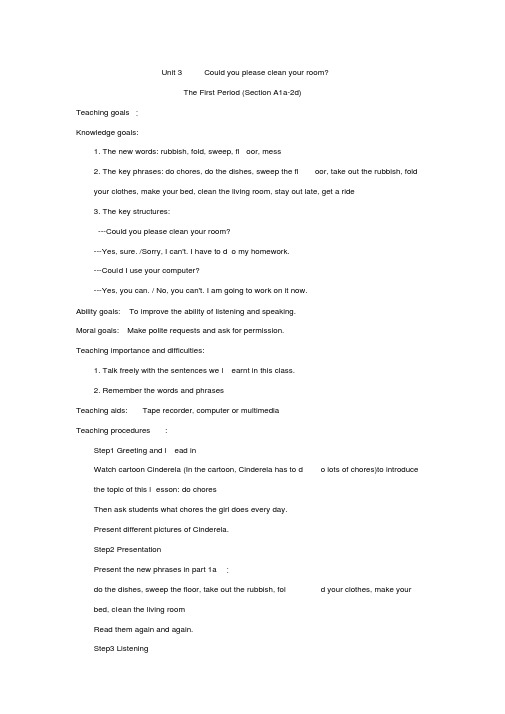
Unit 3 Could you please clean your room?The First Period (Section A1a-2d)Teaching goals:Knowledge goals:1. The new words: rubbish, fold, sweep, fl oor, mess2. The key phrases: do chores, do the dishes, sweep the fl oor, take out the rubbish, foldyour clothes, make your bed, clean the living room, stay out late, get a ride3. The key structures:---Could you please clean your room?---Yes, sure. /Sorry, I can't. I have to d o my homework.---Could I use your computer?---Yes, you can. / No, you can't. I am going to work on it now.Ability goals: To improve the ability of listening and speaking.Moral goals: Make polite requests and ask for permission.Teaching importance and difficulties:1. Talk freely with the sentences we l earnt in this class.2. Remember the words and phrasesTeaching aids: Tape recorder, computer or multimediaTeaching procedures :Step1 Greeting and l ead inWatch cartoon Cinderela (In the cartoon, Cinderela has to d o lots of chores)to introduce the topic of this l esson: do choresThen ask students what chores the girl does every day.Present different pictures of Cinderela.Step2 PresentationPresent the new phrases in part 1a:do the dishes, sweep the floor, take out the rubbish, fol d your clothes, make your bed, cl ean the living roomRead them again and again.Step3 ListeningT: Peter’s room is untidy, peter and his mother are at home, what shoul d they d o?chores or Mom’s chores?1. Now listen to the tape player, then finish part 1b. Peter’sListen it the first time, and check the answers2. Listen it again, then pay attention to the question:T: How does Mum ask peter to help her?----Could you please …?----Yes, sure. / Sorry, I can’t, I have to…Step 4 Pair workLook at the picture in 1a, ask your partner to d o the chores that you see.Example:A: Could you please sweep the fl oor?B: Yes, sure. Can you d o the dishes?ean the living room.A: Well, could you please do them? I ‘m going to clB: No problem.Step 5 Listening1. Look through the tasks in 2a and 2b carefully before listening.2. Play the tape the first time, let the students finish part 2a3. Play the tape the second time and let the stud ents finish the tasks 2b.4. Listen to the tape once more and ask the students to repeat after the tape and checkthe answers by themselves.Question: How to ask for permission?总结请求许可时,常用句型:---Could I…?---Yes, you can. / Sorry, you can’t.Step 6 Group workfather, Peter asks his father if he can do three Student A is Peter, Student B is Peter’smore t hings. Say “yes” or “no”, and give a reason. Such as:A: Could I use your computer?B: Sorry. I’m going to work on it now.A : Well, could I watch TV?B: Yes, you can. But first you have to clean your roomStep 7 Self-studyAsk the students to learn 2d by themselves and finish the tasks of self-study.1. Let students read the conversation loudly, then come up with some questions. Thestudent who raises a question will get 2 points. And the student who answers it will get1 point.2. Read it carefully, then find out the new words and difficult points. Let students showthem in class.3. Role-play the conversation in groups.Step 8 Language points1.Tony, could you please help out with a few things?help out (with something) 是一个动词短语, 表示在某人繁忙或是遇到困难时“给予帮助”。

人教版英语八年级下册Unit 3《Could you please clean your room》说课稿一. 教材分析人教版英语八年级下册Unit 3的主题是“Could you please clean your room?”,主要讨论了日常生活中的一些请求和回应。
通过本节课的学习,学生能够掌握情态动词could的用法,学会如何礼貌地提出请求和回应请求。
教材内容丰富,包括听力、口语、阅读和写作等多个方面,有助于全面提高学生的英语综合能力。
二. 学情分析根据我对学生的了解,他们已经掌握了情态动词can的用法,并具备了一定的听说读写能力。
然而,对于情态动词could的用法,他们还比较陌生。
此外,部分学生在表达请求时,还存在着语气生硬、不礼貌等问题。
因此,在教学过程中,我需要针对这些情况,采取适当的教学策略,帮助学生掌握情态动词could的用法,并培养他们礼貌表达请求的能力。
三. 说教学目标1.知识目标:学生能够掌握情态动词could的用法,了解其表示请求的礼貌性。
2.能力目标:学生能够熟练运用情态动词could提出请求和回应请求,提高日常英语交流能力。
3.情感目标:通过本节课的学习,学生能够学会尊重他人,培养礼貌待人的良好习惯。
四. 说教学重难点1.教学重点:情态动词could的用法,如何用could提出请求和回应请求。
2.教学难点:情态动词could与can的区别,以及在实际情景中灵活运用。
五. 说教学方法与手段1.教学方法:采用任务型教学法,情境教学法,交际法等,激发学生的学习兴趣,提高他们的参与度。
2.教学手段:利用多媒体课件、图片、实物等,创设真实情境,帮助学生更好地理解和学习。
六. 说教学过程1.导入:通过播放一段关于孩子们日常生活的视频,引出本节课的主题“Could you please clean your room?”。
2.新课呈现:介绍情态动词could的用法,并通过例句展示如何用could提出请求和回应请求。
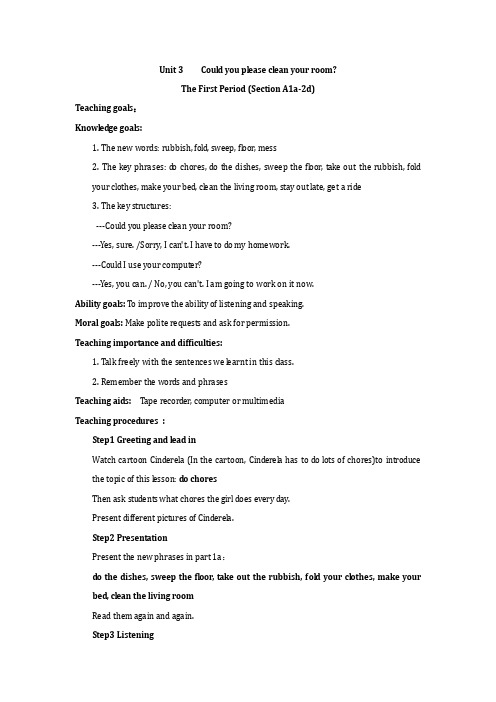
Unit 3 Could you please clean your room?The First Period (Section A1a-2d)Teaching goals:Knowledge goals:1. The new words: rubbish, fold, sweep, fl oor, mess2. The key phrases: do chores, do the dishes, sweep the fl oor, take out the rubbish, foldyour clothes, make your bed, clean the living room, stay out late, get a ride3. The key structures:---Could you please clean your room?---Yes, sure. /Sorry, I can't. I have to d o my homework.---Coul d I use your computer?---Yes, you can. / No, you can't. I am going to work on it now.Ability goals: To improve the ability of listening and speaking.Moral goals: Make polite requests and ask for permission.Teaching importance and difficulties:1. Talk freely with the sentences we l earnt in this class.2. Remember the words and phrasesTeaching aids: Tape recorder, computer or multimediaTeaching procedures :Step1 Greeting and l ead inWatch cartoon Cinderela (In the cartoon, Cinderela has to d o lots of chores)to introduce the topic of this l esson: do choresThen ask students what chores the girl does every day.Present different pictures of Cinderela.Step2 PresentationPresent the new phrases in part 1a:do the dishes, sweep the floor, take out the rubbish, fol d your clothes, make your bed, cl ean the living roomRead them again and again.Step3 ListeningT: Peter’s room is untidy, peter and his mother are at home, what shoul d they d o?1. Now listen to the tape player, then finish part 1b. Peter’s chores or Mom’s chores? Listen it the first time, and check the answers2. Listen it again, then pay attention to the question:T: How does Mum ask peter to help her?----Could you please …?----Yes, sure. / Sorry, I can’t, I have to…Step 4 Pair workLook at the picture in 1a, ask your partner to d o the chores that you see. Example:A: Coul d you please sweep the fl oor?B: Yes, sure. Can you d o the dishes?A: Well, coul d you please do them? I ‘m going to cl ean the living room.B: No problem.Step 5 Listening1. Look through the tasks in 2a and 2b carefully before listening.2. Play the tape the first time, let the students finish part 2a3. Play the tape the second time and let the stud ents finish the tasks 2b.4. Listen to the tape once more and ask the students to repeat after the tape and check the answers by themselves.Question: How to ask for permission?总结请求许可时,常用句型:---Coul d I…?---Yes, you can. / Sorry, you can’t.Step 6 Group workStudent A is Peter, Stud ent B is Peter’s father, Peter asks his father if he can do three more t hings. Say “yes” or “no”, and give a reason. Such as:A: Could I use your computer?B: Sorry. I’m going to work on it now.A : Well, coul d I watch TV?B: Yes, you can. But first you have to clean your roomStep 7 Self-studyAsk the students to learn 2d by themselves and finish the tasks of self-study.1. Let stud ents read the conversation l oudly, then come up with some questions. Thestudent who raises a question will get 2 points. And the student who answers it will get1 point.2. Read it carefully, then find out the new words and difficult points. Let students showthem in class.3. Role-play the conversation in groups.Step 8 Language points1.Tony, could you please help out with a few things?help out (with something) 是一个动词短语, 表示在某人繁忙或是遇到困难时“给予帮助”。

人教新目标八年级英语下册 Unit 3 Could you please clean your room 教学设计一. 教材分析人教新目标八年级英语下册Unit 3 Could you please clean your room?主要围绕日常生活场景展开,让学生学会用情态动词could提出请求和建议,并学会用短语clean one’s room, do one’s homework等描述日常活动。
本节课的主要语言点是情态动词could的用法,以及如何用它来提出请求和建议。
同时,本节课还涉及到一些日常交际用语,如How about doing sth?和What about doing sth?等。
二. 学情分析八年级的学生已经掌握了情态动词can的用法,对日常交际用语也有一定的了解。
但是,对于情态动词could的用法以及如何用它来提出请求和建议还需要进一步的讲解和操练。
此外,学生对于如何运用日常交际用语进行实际交流还需要加强练习。
三. 教学目标1.学生能够掌握情态动词could的用法,并学会用它来提出请求和建议。
2.学生能够熟练运用日常交际用语进行交流,如How about doing sth?和What about doing sth?3.学生能够在日常生活中运用所学知识,描述自己的日常活动并提出建议。
四. 教学重难点1.情态动词could的用法。
2.如何用情态动词could提出请求和建议。
3.日常交际用语的运用。
五. 教学方法1.任务型教学法:通过设定各种日常生活中的任务,让学生在完成任务的过程中学习和运用所学知识。
2.交际法:通过模拟日常生活中的场景,让学生在实际交流中学会运用所学知识。
3.情境教学法:通过创设各种日常生活中的情境,让学生在情境中学习和运用所学知识。
六. 教学准备1.教学课件:制作与本节课内容相关的课件,包括图片、视频等。
2.教学材料:准备与本节课内容相关的材料,如日常生活中的任务清单等。

Unit3 Could you please clean your room?【重点单词】rubbish [ˈrʌbɪʃ] n. 垃圾,废物take out the rubbish 倒垃圾fold [fəʊld] v. 对折,折叠mess [mes] n. 混乱,脏乱,食堂throw [θrəʊ] v. 扔,投掷all the time 频繁,反复neither [ˈni:ðə] pron.adv. 二者都不;也不shirt [ʃə:t] n. 运动衫,衬衫as soon as 一…就…,尽快pass [pɑ:s] v. 前行,经过,批准borrow ['bɒrəʊ] v. 借,借用lend [lend] v. 借给,借出finger [ˈfiŋgə(r)] n. 手指hate [heɪt] v. 憎恶,讨厌chore [tʃɔ:(r)] n. 杂务,乏味的工作while [wail] conj. 当...时候,而,然而snack [snæk] n. 小吃,点心,快餐stress [stres] n. 精神压力,心理负担waste [weɪst] v. 浪费,消耗in order to 目的是,为了provide [prə'vaid] v. 提供,供给,供应anyway [ˈeniwei] adv. 无论如何,不管怎样,而且depend [diˈpend] v. 取决于,依靠,依赖depend on 依靠于develop [dɪˈveləp] v. 发展,壮大,开发,研制independent [ˌindiˈpendənt] adj. 独立自主的,不受约束的independence [ˌɪndɪ'pendəns] n. 独立fair [fɛə] adj. 公平的,公正的unfair [ˌʌnˈfeə] adj. 不公平的,有偏见的fairness [ˈfeənɪs] n. 公正性,合理性since [sɪns] conj. 因为,既然neighbor [ˈneɪbə] n. 邻居take care of 照顾,处理ill [il] adj. 生病的,有病的drop [drɔp] v. 落下,跌落【重点短语】1.go out for dinner 出去吃饭2.stay out late 在外面待到很晚3.go to the movies 去看电影4.get a ride 搭车5.work on 从事6.finish doing sth. 完成做某事7.clean and tidy 干净整洁的8.do the dishes 洗餐具9.take out the rubbish 倒垃圾10.fold your/the clothes 叠衣服11.sweep the floor 扫地12.make your/the bed 整理床铺13.clean the livng room 打扫客厅14.no problem 没问题15.welcome sb. 欢迎某人e home from school/work放学/下班回家17.throw down 扔下18.sit down 坐下e over 过来20.take sb. for a walk 带某人去散步21.all the time 一直;总是22.all day/evening 整曰/夜23.do housework 做家务24.shout back 大声回应25.walk away 走开26.share the housework 分担家务27.a comfortable home 一个舒适的家28.in surprise 惊讶地29.get something to drink 拿点喝的东西30.watch one show 观看一个节目31.hang out 闲逛32.pass sb. sth. 把某物传给某人33.lend sb. sth. 把某物借给某人34.get sth. wet 使某物弄湿35. hate to do sth. 讨厌做某事36.do chores 做杂务37.help sb. (to ) d o /with sth•帮助某人干某事38.bring a tent带顶帐篷来39.buy some snacks买些小吃40.go to the store去商店41.invite sb. to a party邀请某人参加聚会42.make sb. do sth. 使某人做某事43.enough stress足够的压力44.a waste of time浪费时间45.in order to为了46.get good grades取得好成绩47.mind doing sth. 介意做某事48.depend on依赖;依靠49.develop children ’ s independence发展孩子的独立性50.look after/take care of 照顾;照看51.do one’ s part in (doing ) sth. 做某人分内的事【重点句型】1.Could you please clean your room? 你能打扫一下你的房间吗?2. I have to do some work. 我必须干些活。
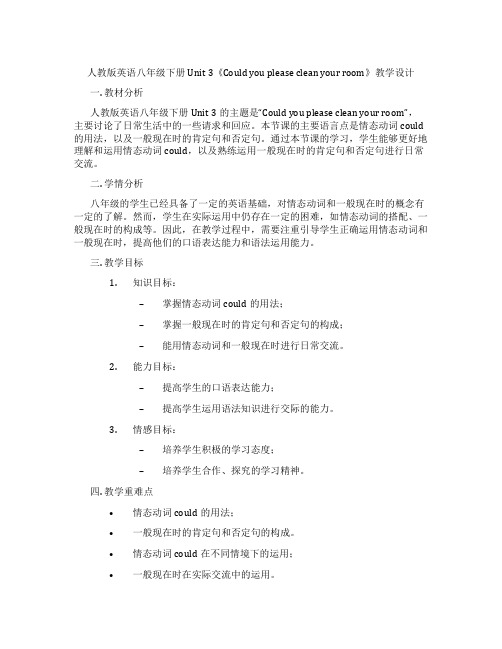
人教版英语八年级下册Unit 3《Could you please clean your room》教学设计一. 教材分析人教版英语八年级下册Unit 3的主题是“Could you please clean your room”,主要讨论了日常生活中的一些请求和回应。
本节课的主要语言点是情态动词could 的用法,以及一般现在时的肯定句和否定句。
通过本节课的学习,学生能够更好地理解和运用情态动词could,以及熟练运用一般现在时的肯定句和否定句进行日常交流。
二. 学情分析八年级的学生已经具备了一定的英语基础,对情态动词和一般现在时的概念有一定的了解。
然而,学生在实际运用中仍存在一定的困难,如情态动词的搭配、一般现在时的构成等。
因此,在教学过程中,需要注重引导学生正确运用情态动词和一般现在时,提高他们的口语表达能力和语法运用能力。
三. 教学目标1.知识目标:–掌握情态动词could的用法;–掌握一般现在时的肯定句和否定句的构成;–能用情态动词和一般现在时进行日常交流。
2.能力目标:–提高学生的口语表达能力;–提高学生运用语法知识进行交际的能力。
3.情感目标:–培养学生积极的学习态度;–培养学生合作、探究的学习精神。
四. 教学重难点•情态动词could的用法;•一般现在时的肯定句和否定句的构成。
•情态动词could在不同情境下的运用;•一般现在时在实际交流中的运用。
五. 教学方法1.任务型教学法:通过设定各种现实生活中的任务,引导学生运用所学知识进行完成,提高学生的实际运用能力。
2.情境教学法:创设各种生活情境,让学生在真实的环境中感受和理解语法知识。
3.合作学习法:学生进行小组讨论和合作,培养学生的团队精神和学习兴趣。
六. 教学准备1.教学材料:人教版英语八年级下册教材;2.教学辅助材料:PPT、图片、卡片等;3.教学设备:投影仪、电脑、黑板等。
七. 教学过程1.导入(5分钟)–利用PPT展示一些杂乱的房间图片,引导学生谈论房间的情况,激发学生的学习兴趣。

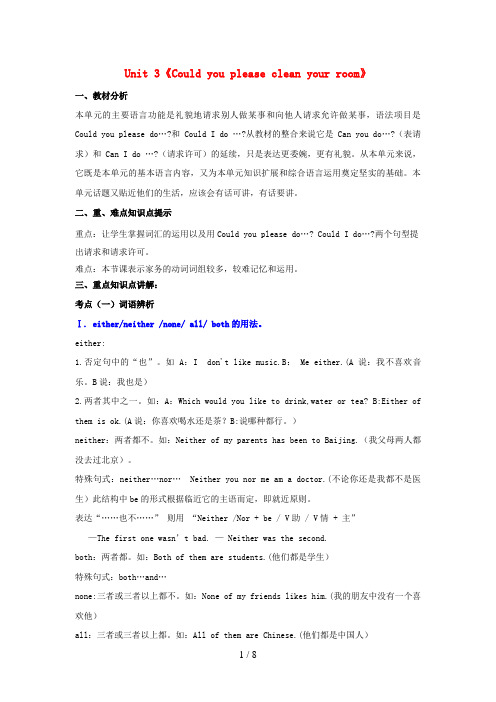
Unit 3《Could you please clean your room》一、教材分析本单元的主要语言功能是礼貌地请求别人做某事和向他人请求允许做某事,语法项目是Could you please do…?和Could I do …?从教材的整合来说它是Can you do…?(表请求)和Can I do …?(请求许可)的延续,只是表达更委婉,更有礼貌。
从本单元来说,它既是本单元的基本语言内容,又为本单元知识扩展和综合语言运用奠定坚实的基础。
本单元话题又贴近他们的生活,应该会有话可讲,有话要讲。
二、重、难点知识点提示重点:让学生掌握词汇的运用以及用Could you please do…? Could I do…?两个句型提出请求和请求许可。
难点:本节课表示家务的动词词组较多,较难记忆和运用。
三、重点知识点讲解:考点(一)词语辨析Ⅰ. either/neither /none/ all/ both的用法。
either:1.否定句中的“也”。
如 A:I don't like music.B: Me either.(A说:我不喜欢音乐。
B说:我也是)2.两者其中之一。
如:A:Which would you like to drink,water or tea? B:Either of them is ok.(A说:你喜欢喝水还是茶?B:说哪种都行。
)neither:两者都不。
如:Neither of my parents has been to Baijing.(我父母两人都没去过北京)。
特殊句式:neither…nor… Neither you nor me am a doctor.(不论你还是我都不是医生)此结构中be的形式根据临近它的主语而定,即就近原则。
表达“……也不……” 则用“Neither /Nor + be / V助 / V情 + 主”—The first one wasn’t bad. — Neither was the second.both:两者都。


人教版八年级英语下册《Unit3 Could you please clean your room》教学设计(第5课时)一. 教材分析人教版八年级英语下册《Unit3 Could you please clean your room》主要围绕日常生活场景展开,培养学生的日常交流能力和表达能力。
本节课时主要学习一般现在时的被动语态,通过一个关于孩子们做家务的对话,让学生理解和运用一般现在时的被动语态。
二. 学情分析八年级的学生已经掌握了基本的英语语法和词汇,具备一定的听说读写能力。
但对于一般现在时的被动语态可能还比较陌生,需要通过大量的练习来掌握。
同时,学生可能对家务话题感兴趣,可以激发他们的学习积极性。
三. 教学目标1.能理解一般现在时的被动语态的构成和用法。
2.能用一般现在时的被动语态进行日常交流。
3.能听懂、说出一篇关于家务话题的对话。
四. 教学重难点1.一般现在时的被动语态的构成和用法。
2.如何运用一般现在时的被动语态进行日常交流。
五. 教学方法采用任务型教学法,通过大量的练习和实际操作,让学生在实践中掌握一般现在时的被动语态。
同时,采用情境教学法,创设日常生活中的场景,让学生在真实的环境中学习和运用英语。
六. 教学准备1.PPT课件2.相关家务话题的图片七. 教学过程1.导入(5分钟)利用图片引入家务话题,让学生猜测图片中的人物在做什么,激发学生的学习兴趣。
2.呈现(10分钟)通过PPT课件展示一般现在时的被动语态的构成和用法,让学生初步了解一般现在时的被动语态。
3.操练(10分钟)让学生分成小组,根据PPT课件上的例子,用一般现在时的被动语态进行问答,加强学生对一般现在时的被动语态的运用。
4.巩固(10分钟)让学生听录音,跟读对话,模仿语音语调,巩固所学内容。
5.拓展(10分钟)让学生编写一段对话,话题不限,要求运用一般现在时的被动语态。
6.小结(5分钟)对本节课所学内容进行小结,强调一般现在时的被动语态的构成和用法。

Unit 3 Could you please clean your room 重点词组Section Ado chores 做家务do the dishes 洗碗sweep the floor 扫地take out the rubbish 扔垃圾make the bed 铺床fold the clothes 叠衣服clean the living room 打扫客厅no problem 没问题go out for dinner 出去吃晚饭go to the movies 去看电影stay out 待在外头(不在家)get a ride 骑车have to do sth. 不得不做。
need to do sth. 需要做。
do some work 做一些工作eat breakfast 吃早饭have a basketball game 举行一场篮球赛work on sth. 使用。
工作help out with 帮助解决a few 一点点at least 至少finish doing sth. 完成做某事want sb. to do sth. 想要某人做某事so much 这么多be back 回来any minute 随时/马上clean and tidy 干净整洁be angry with 对某人生气solve the problem 解决问题throw down 扔下in front of 在。
前面come over 过来take...for a walk 带。
去散步all the time 一直all day 整个白天do housework 做家务all evening 整个夜晚shout back 吼叫还击walk away 走开come home from work 下班回家in surprise 惊讶地share the housework 分担家务sit down 坐下hang out 出去玩help sb. (to) do sth. 帮助某人做某事how much 多少come back 回来try (not) to do sth. 努力(不)做某事hate to do sth. 讨厌做某事Section Bask sb. to do sth. 让某人做某事next to 靠近have a party 参加派对have a test 参加考试mean doing sth. 意味着。
Unit 3 Could you please clean your room?The First Period (Section A1a-2d)Teaching goals:Knowledge goals:1. The new words: rubbish, fold, sweep, fl oor, mess2. The key phrases: do chores, do the dishes, sweep the fl oor, take out the rubbish, foldyour clothes, make your bed, clean the living room, stay out late, get a ride3. The key structures:---Could you please clean your room?---Yes, sure. /Sorry, I can't. I have to d o my homework.---Coul d I use your computer?---Yes, you can. / No, you can't. I am going to work on it now.Ability goals: To improve the ability of listening and speaking.Moral goals: Make polite requests and ask for permission.Teaching importance and difficulties:1. Talk freely with the sentences we l earnt in this class.2. Remember the words and phrasesTeaching aids: Tape recorder, computer or multimediaTeaching procedures :Step1 Greeting and l ead inWatch cartoon Cinderela (In the cartoon, Cinderela has to d o lots of chores)to introduce the topic of this l esson: do choresThen ask students what chores the girl does every day.Present different pictures of Cinderela.Step2 PresentationPresent the new phrases in part 1a:do the dishes, sweep the floor, take out the rubbish, fol d your clothes, make your bed, cl ean the living roomRead them again and again.Step3 ListeningT: Peter’s room is untidy, peter and his mother are at home, what shoul d they d o?1. Now listen to the tape player, then finish part 1b. Peter’s chores or Mom’s chores? Listen it the first time, and check the answers2. Listen it again, then pay attention to the question:T: How does Mum ask peter to help her?----Could you please …?----Yes, sure. / Sorry, I can’t, I have to…Step 4 Pair workLook at the picture in 1a, ask your partner to d o the chores that you see. Example:A: Coul d you please sweep the fl oor?B: Yes, sure. Can you d o the dishes?A: Well, coul d you please do them? I ‘m going to cl ean the living room.B: No problem.Step 5 Listening1. Look through the tasks in 2a and 2b carefully before listening.2. Play the tape the first time, let the students finish part 2a3. Play the tape the second time and let the stud ents finish the tasks 2b.4. Listen to the tape once more and ask the students to repeat after the tape and check the answers by themselves.Question: How to ask for permission?总结请求许可时,常用句型:---Coul d I…?---Yes, you can. / Sorry, you can’t.Step 6 Group workStudent A is Peter, Stud ent B is Peter’s father, Peter asks his father if he can do three more t hings. Say “yes” or “no”, and give a reason. Such as:A: Could I use your computer?B: Sorry. I’m going to work on it now.A : Well, coul d I watch TV?B: Yes, you can. But first you have to clean your roomStep 7 Self-studyAsk the students to learn 2d by themselves and finish the tasks of self-study.1. Let stud ents read the conversation l oudly, then come up with some questions. Thestudent who raises a question will get 2 points. And the student who answers it will get1 point.2. Read it carefully, then find out the new words and difficult points. Let students showthem in class.3. Role-play the conversation in groups.Step 8 Language points1.Tony, could you please help out with a few things?help out (with something) 是一个动词短语, 表示在某人繁忙或是遇到困难时“给予帮助”。
再如本单元中这句话:You watch TV all the time and never help out around the house!你老是看电视,从不帮忙干家务。
另外help 与out 之间还可以加具体的人,如:Can you help me out? 你能帮我一把吗?They helped (us) out with the cl ean-up. 他们帮助我们做大扫除。
2.. …because Mom will be back from shopping any minute now. …因为妈妈随时都会买完东西回来。
any minute now 是一种常见口语表达,相当于“随时;马上;在任何时候”的意思,minute 还可替换为“second, moment, time等。
e.g. we are expecting them any moment now.我们期待他们随时到来。
Step 9 Summary1. The new words: rubbish, fold, sweep, floor, mess2. The key phrases: do chores, do the dishes, sweep the floor, take out the rubbish, foldyour clothes, make your bed, clean the living room, stay out late, get a ride3. The key structures:---Could you please clean your room?---Yes, sure. /Sorry, I can't. I have to d o my homework.---Coul d I use your computer?---Yes, you can. / No, you can't. I am going to work on it now.Step 10 Check exercises(一)、用所给词的适当形式填空。
1. This is her bike. _______(I) is over there.2. Look! The _______(live) room is very big.3. She can’t go out with us this evening because her parents _______(agree).4. I was late for the _______(meet) yesterday.5. Could you pl ease_______(turn) off the player? It’s too noisy.(二)、选最佳答案1. A: Could you please sweep the floor?B: _______. I have to d o my homework.A. Yes, sure.B. Why not?C. Sorry, you can’tD. Sorry, I can’t2. A: Could you please buy _______ drinks and snacks?B: Sorry. I d on’t have _______ money.A. some, anyB. any, anyC. some, someD. any, some3. Nancy, thanks for _________ care of my goldfish.A. takeB. takesC. takingD. took4. We’ll have _____________ to d o in English class.A. something differentB. different somethingC.. anything differentD. different anything5. This shirt is a little ___________ than that one.A.cheapB. cheaperC. the cheapestD. CheaperStep 11 Reflection。